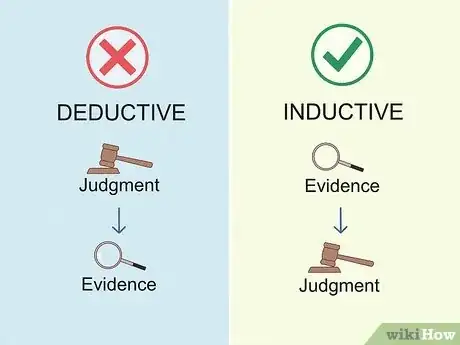This article was co-authored by Kelli Miller, LCSW, MSW and by wikiHow staff writer, Nihal Shetty. Kelli Miller is a Psychotherapist, Author, and TV/radio host based in Los Angeles, California. Kelli is currently in private practice and specializes in individual and couples' relationships, depression, anxiety, sexuality, communication, parenting, and more. Kelli also facilitates groups for those struggling with alcohol and drug addiction as well as anger management groups. As an author, she received a Next Generation Indie Book Award for her book "Thriving with ADHD: A Workbook for Kids" and also wrote "Professor Kelli's Guide to Finding a Husband". Kelli was a host on LA Talk Radio, a relationship expert for The Examiner, and speaks globally. You can also see her work on YouTube: https://www.youtube.com/user/kellibmiller, Instagram @kellimillertherapy, and her website: www.kellimillertherapy.com. She received her MSW (Masters of Social Work) from the University of Pennsylvania and a BA in Sociology/Health from the University of Florida.
There are 24 references cited in this article, which can be found at the bottom of the page.
This article has been viewed 26,283 times.
It’s hard to imagine anything more useful than knowing what other people are thinking. But if people’s thoughts seem to be locked away in their own heads, how can you read their minds? Plenty of ways, as it turns out. By being observant and open-minded, you can actually begin to make educated guesses on how other people are feeling. We’re here to show you how with this complete guide on how to read people’s minds.
Steps
Community Q&A
-
QuestionHow can I tell if someone likes me without asking?
 Mark RosenfeldMark Rosenfeld is a Dating and Relationship Coach for women and founded Make Him Yours in 2015. Mark specializes in helping people find, attract, and keep extraordinary relationships. He has been featured in Style Magazine, Thought Catalog, Elite Daily, News.com.au, and The Good Men Project. Mark’s dating videos have received over 60 million views, and his book “Make Him Yours – Beating the Odds of Modern Dating” was a best-seller on Amazon on its release.
Mark RosenfeldMark Rosenfeld is a Dating and Relationship Coach for women and founded Make Him Yours in 2015. Mark specializes in helping people find, attract, and keep extraordinary relationships. He has been featured in Style Magazine, Thought Catalog, Elite Daily, News.com.au, and The Good Men Project. Mark’s dating videos have received over 60 million views, and his book “Make Him Yours – Beating the Odds of Modern Dating” was a best-seller on Amazon on its release.
Dating & Relationship Coach Watch their actions. Someone who likes you will be very responsive to you. They'll want to talk to you, text you, and spend time with you.
Watch their actions. Someone who likes you will be very responsive to you. They'll want to talk to you, text you, and spend time with you. -
QuestionHow do I tell if my partner is irritated or mad at me?
 Kelli Miller, LCSW, MSWKelli Miller is a Psychotherapist, Author, and TV/radio host based in Los Angeles, California. Kelli is currently in private practice and specializes in individual and couples' relationships, depression, anxiety, sexuality, communication, parenting, and more. Kelli also facilitates groups for those struggling with alcohol and drug addiction as well as anger management groups. As an author, she received a Next Generation Indie Book Award for her book "Thriving with ADHD: A Workbook for Kids" and also wrote "Professor Kelli's Guide to Finding a Husband". Kelli was a host on LA Talk Radio, a relationship expert for The Examiner, and speaks globally. You can also see her work on YouTube: https://www.youtube.com/user/kellibmiller, Instagram @kellimillertherapy, and her website: www.kellimillertherapy.com. She received her MSW (Masters of Social Work) from the University of Pennsylvania and a BA in Sociology/Health from the University of Florida.
Kelli Miller, LCSW, MSWKelli Miller is a Psychotherapist, Author, and TV/radio host based in Los Angeles, California. Kelli is currently in private practice and specializes in individual and couples' relationships, depression, anxiety, sexuality, communication, parenting, and more. Kelli also facilitates groups for those struggling with alcohol and drug addiction as well as anger management groups. As an author, she received a Next Generation Indie Book Award for her book "Thriving with ADHD: A Workbook for Kids" and also wrote "Professor Kelli's Guide to Finding a Husband". Kelli was a host on LA Talk Radio, a relationship expert for The Examiner, and speaks globally. You can also see her work on YouTube: https://www.youtube.com/user/kellibmiller, Instagram @kellimillertherapy, and her website: www.kellimillertherapy.com. She received her MSW (Masters of Social Work) from the University of Pennsylvania and a BA in Sociology/Health from the University of Florida.
Psychotherapist Start by looking at their face to see if they're frowning or look upset. If they're upset with you, they might be really quiet or could have a big shift in energy. You could also check their body language. If they're upset, they may cross their arms over their body. You may also notice that their tone of voice sounds annoyed or that they're snapping at you.
Start by looking at their face to see if they're frowning or look upset. If they're upset with you, they might be really quiet or could have a big shift in energy. You could also check their body language. If they're upset, they may cross their arms over their body. You may also notice that their tone of voice sounds annoyed or that they're snapping at you.
References
- ↑ https://www.psychhelp.com.au/can-a-psychologist-read-your-mind/
- ↑ Kelli Miller, LCSW, MSW. Psychotherapist. Expert Interview. 11 June 2020.
- ↑ https://indianexpress.com/article/lifestyle/workplace/heres-how-mind-reading-at-workplace-can-benefit-you-2832530/
- ↑ https://discovery.ucl.ac.uk/id/eprint/1430329/7/Fonagy_chapter1_draft_pfrevised_protected.pdf
- ↑ https://www.bath.ac.uk/announcements/women-better-at-reading-minds-than-men-new-study/
- ↑ https://www.neurologyadvisor.com/topics/autism-spectrum-disorder/the-consequences-of-compensation-in-autism/
- ↑ https://greatergood.berkeley.edu/article/item/how_putting_yourself_in_someone_elses_shoes_may_backfire
- ↑ https://www.usip.org/public-education-new/what-active-listening
- ↑ https://www.helpguide.org/articles/relationships-communication/nonverbal-communication.htm
- ↑ https://pubmed.ncbi.nlm.nih.gov/28072452/
- ↑ https://www.helpguide.org/articles/relationships-communication/nonverbal-communication.htm
- ↑ https://www.nbcnews.com/healthmain/how-spot-fake-smile-its-all-eyes-1c9386917
- ↑ Kelli Miller, LCSW, MSW. Psychotherapist. Expert Interview. 11 June 2020.
- ↑ https://essay.utwente.nl/72853/1/Thesis_%20Bianca_%20Ciuffani_s1108905.pdf
- ↑ https://www.helpguide.org/articles/relationships-communication/nonverbal-communication.htm
- ↑ Kelli Miller, LCSW, MSW. Psychotherapist. Expert Interview. 11 June 2020.
- ↑ https://www.edutopia.org/discussion/being-mindful-cultural-differences
- ↑ https://www.ncbi.nlm.nih.gov/pmc/articles/PMC3840427/
- ↑ https://www.edutopia.org/discussion/being-mindful-cultural-differences
- ↑ https://www.scientificamerican.com/article/how-you-feel-what-another-body-feels/
- ↑ https://lesley.edu/article/the-psychology-of-emotional-and-cognitive-empathy#
- ↑ https://www.umgc.edu/current-students/learning-resources/writing-center/online-guide-to-writing/tutorial/chapter3/ch3-21.html
- ↑ https://www.psychologytoday.com/us/blog/close-encounters/202009/what-can-we-learn-about-people-their-social-media
- ↑ https://www.psychologicalscience.org/news/releases/how-well-do-you-know-your-friends.html
- ↑ https://pubmed.ncbi.nlm.nih.gov/34566800/
- ↑ https://www.mequilibrium.com/resources/secrets-of-communication-from-a-professional-mind-reader/
- ↑ https://iep.utm.edu/deductive-inductive-arguments/
- ↑ https://www.healthyplace.com/blogs/anxiety-schmanxiety/2015/12/social-anxietys-minions-mind-reading-and-projecting
- ↑ https://greatergood.berkeley.edu/article/item/how_putting_yourself_in_someone_elses_shoes_may_backfire
- ↑ https://www.nature.com/articles/502428a




































































